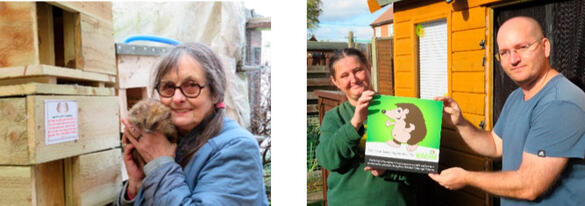Does Wildlife Rescue need Rescuing?
It is late May and i have just received another phone call from a wildlife rescue asking for support - a nominal amount to help tide over the forthcoming weeks ahead. It is one of several requests this week. It goes against my own morals and value; the charity's aims - that i am unable to help because of the effects of the Coronavirus pandemic lockdown.
It is about to reach high peak with wildlife casualty admissions for all wildlife hospitals and their finances, their access to life saving equipment, medication and food for wildlife in their care is beyond stretched.
Some hospitals have great community support - but as communities continue to be affected severly by the Covoid-19 pandemic there is little or nothing spare to go around.
Here is the scenario many rescue centres are facing:
A Hedgehog Rescuer near Hull:
The Hedgehog that was admitted with a severe head injury, from a garden strimmer, will be cared for and every effort made for its survival - however the chance of its survival is in the balance more so than ever before. We have no funding left and our vets are unable to offer any medication for us. They always had before the pandemic.
It is well known that the population of Hedgehogs in Britain is suffering from a serious decline. The most recent analysis of the research done through the work of the British Hedgehog Preservation Society and the People’s Trust for Endangered Species indicates that urban populations have fallen by up to 30% and rural populations by at least 50% since the turn of the century.
The Barn Swallow nest that was knocked down because it was 'unsightly' had a small brood of fledglings in it. They cannot yet fly and need professional care to survive. Pick up the phone and call a wildlife rescue - no answer because they closed weeks before.
The Swallow migrates to the UK from Sub-Sahara Africa to breed here. Flown thousands of km they arrive in the UK exhasuted and starving. The window to breed is short. Their nests are constructed from earth, dried grass, small twigs, feather - it is an honor that this little bird has chosen your home to raise its own family.
The Impact
The closure of wildlife hospitals will be a slow and devastating. For the professionals, the carers, the volunteers, livelihoods, skills and knowledge are lost. Wildlife will suffer the loss more. Wildlife and their habitats, already under immense pressure shall may not be cared for to the level they were before the pandemic. It does not mean that the casualties stop arriving. Any wildlife rescuer will want to care for and rehabilitate that injured or orphaned animal - they are skilled and very knowledgable - yet without the resources to do this. It becomes an impossible task and animals then start to disappear where they could have been saved.
'We might now be facing more wildlife on the brink of disappearing from our lives.'
The small, independent wildlife hospitals are most vulnerable. If they start to close then for wildlife it is bad news. Those several dozen Hedgehogs that were once cared for and returned back to the wild at one hospital are 10, 20, 30 fold across the country. Thousands may not see the wild. The affect on wild populations will be damaging.
The Solution
A call to action!
WildAid has he capacity to get resources out there to the wildlife hospitals. We have been providing support and advice to the wildlife rescue community for over 25 years.
We cannot do it alone - we urgently need your support - your donation, your generosity, your ideas, your time is so valuable right now. Please reach out!
"It's all about encouraging people to participate and learn about the natural world through hands on discovery."

